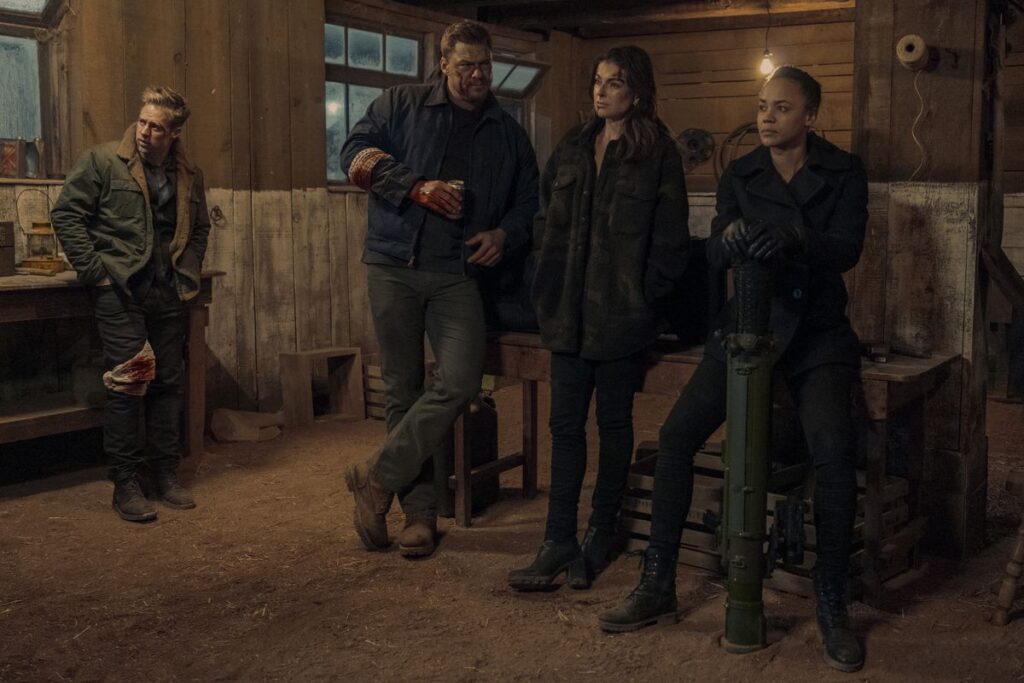As I write this, Reacher is the No. 2 show on Prime Video according to the site’s ranking, almost two full months after its second season premiered. Prior to that, it spent most of the last couple months at the No. 1 slot — the show is, according to Amazon’s public metrics, a huge hit, and yet every time I tell people to watch it, they’re always a bit skeptical. “Really?” they wonder, as if I have ever liked a bad show. Yes, I tell them. Really. I still would, even though I have spent some time now feeling fairly grumpy about how Reacher season 2 has turned out. Uneven as it’s been, Reacher is a reminder that time is one of TV’s biggest strengths, and the natural peaks and valleys a show experiences over its life can only serve to reinforce what makes it special.
A big part of what makes Reacher successful is in the way it clearly takes after the sort of long-running cable shows that don’t really get made anymore. It’s got Justified energy, a slick baseline of cool and straightforward simplicity that gives the show’s writers room to do uncomplicated cowboy shit in one episode and then display a surprising depth and understanding of its genre politics in the next. That baseline is also sturdy enough to ride out the show’s bad decisions, a foundation strong enough to hold together in the hopes that the next scene, episode, or season will set things right.
This is why I’m still pumped for more Reacher, even if season 2 made the mistake of telling, as Polygon editor Pete Volk puts it, “a season 6 story” done too early. Jack Reacher (Alan Ritchson) as established in season 1 was a drifter, a former military special investigator that wanted to travel the country with naught but the clothes on his back and an annoying sense of justice that kept him getting involved in local problems when he’d rather not be. Usually with his massive cinder block hands.
Photo: Brooke Palmer/Prime Video
Season 2 of Reacher abandoned a rock-solid Western-like structure where Jack Reacher is the Man With No Name getting embroiled in a local mystery, and instead mined Reacher’s past to tell a story about his former team of military investigators getting picked off. On a character level, this foregrounds backstory better delivered piecemeal over the show’s run, slowly introducing characters from Reacher’s past that can then recur as his personal history is further fleshed out. Aesthetically, it turns Reacher into an entirely different type of action show, a spec ops thriller that Prime Video already has in Jack Ryan, eschewing the distinct fun of Jack Reacher solving problems with a potent combination of brainpower and muscle mass. And narratively, a story like this pushes Reacher over the line from playful genre interrogation to more full-blown right-wing vigilante fantasy, escalating the plot to one of National Security and The Greater Good, where a smaller, local story allows Reacher’s writers to introduce local nuance and greater depth.
When you consider the realities of modern TV production, all of the season 2 made by Reacher’s showrunners make sense. Even if star Alan Ritchson wasn’t red-hot and in-demand right now, it behooves a successful action series to build out a cast of characters that can share the hard work of cinematic ass-kicking, and a team of special investigators is a great pull from the Lee Child novels Reacher is based on to solve that problem. What’s more, tomorrow isn’t promised in the streaming era, where beloved shows rarely get more than three or four seasons — so if Jack Reacher’s military backstory is a narrative priority for Reacher’s writers, it makes sense to tell it now, and get it out of the way.
The shaky business of the post-streaming boom means that tried-and-true formats like the long-running roughneck cable procedural aren’t seen as viable, despite the stability they provide audiences, cast, and crew. But letting shows run good and long isn’t just a great way to run at the business of television — sometimes it’s the best way to tell stories, too. With a bunch of episodes where one very large man solves a nearly as large problem, strolling off into the sunset as the credits roll and we log off for the night.
This kind of show deserves to run for seven or more seasons, like a Star Trek or Monk. The trick to spotting a show like this to get behind is simple: Even when it’s bad, you can easily articulate why. Not only do I think Reacher can do better, I think it will do better. Like a father figure that would probably show up in an episode of Reacher, I’m really not mad at all. I’m just disappointed.

